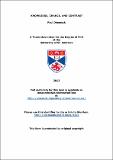Files in this item
Knowledge, chance, and contrast
Item metadata
| dc.contributor.advisor | Brown, Jessica (Jessica Anne) | |
| dc.contributor.advisor | Greenough, Patrick | |
| dc.contributor.author | Dimmock, Paul | |
| dc.coverage.spatial | 225 | en_US |
| dc.date.accessioned | 2012-10-19T13:46:13Z | |
| dc.date.available | 2012-10-19T13:46:13Z | |
| dc.date.issued | 2012-11-30 | |
| dc.identifier.uri | https://hdl.handle.net/10023/3202 | |
| dc.description.abstract | The late 1980s and early 1990s saw the rise of contextualist theories of knowledge ascriptions (and denials). Contextualists about ‘knows’ maintain that utterances of the form ‘S knows p’ and ‘S doesn’t know p’ resemble utterances such as ‘Peter is here’ and ‘Peter is not here’, in the sense that their truth-conditions vary depending upon features of the context in which they are uttered. In recent years, contextualism about ‘knows’ has come under heavy attack. This has been associated with a proliferation of defences of so-called invariantist accounts of knowledge ascriptions, which stand united in their rejection of contextualism. The central goal of the present work is two-fold. In the first instance, it is to bring out the serious pitfalls in many of those recent defences of invariantism. In the second instance, it is to establish that the most plausible form of invariantism is one that is sceptical in character. Of course, the prevailing preference in epistemology is for non- sceptical accounts. The central conclusions of the thesis might therefore be taken to show that – despite recent attacks on its plausibility – some form of contextualism about ‘knows’ must be correct. However, this project is not undertaken without at least the suspicion that embracing (a particular form of) sceptical invariantism is to be preferred to embracing contextualism. In the course of the discussion, I therefore not only attempt to rebut some standard objections to sceptical invariantism, but also to reveal – in at least a preliminary way – how the sceptical invariantist might best argue for the superiority of her account to that of the contextualist. | en_US |
| dc.language.iso | en | en_US |
| dc.publisher | University of St Andrews | |
| dc.subject.lcc | B809.14D5 | |
| dc.subject.lcsh | Contextualism (Philosophy) | en_US |
| dc.subject.lcsh | Knowledge, Theory of | en_US |
| dc.subject.lcsh | Skepticism | en_US |
| dc.subject.lcsh | Chance | en_US |
| dc.subject.lcsh | Possibility | en_US |
| dc.title | Knowledge, chance, and contrast | en_US |
| dc.type | Thesis | en_US |
| dc.type.qualificationlevel | Doctoral | en_US |
| dc.type.qualificationname | PhD Doctor of Philosophy | en_US |
| dc.publisher.institution | The University of St Andrews | en_US |
This item appears in the following Collection(s)
Items in the St Andrews Research Repository are protected by copyright, with all rights reserved, unless otherwise indicated.

